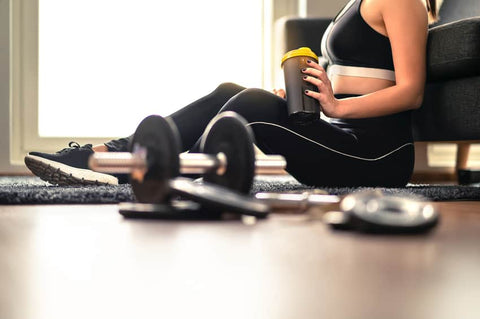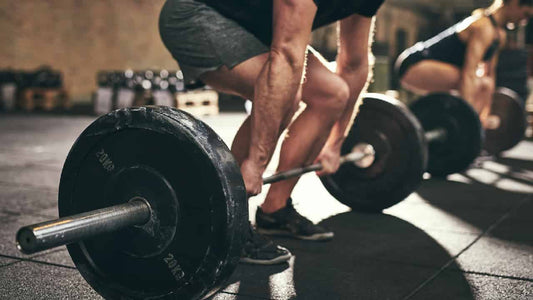Let's face the facts here: if you're putting in hours and hours of training and pushing your limits in the gym every week, you don't want to blow your progress eating at the wrong time or eating the wrong foods once you are home.
Who can agree?
Whether you're looking to gain muscle, lose fat, or maintain your current health status, proper post-workout nutrition is key to achieving your goals.
Look at any internet page—you'll likely see all sorts of convincing stories of why you should eat this, why you shouldn't eat that, and a slew of other contradicting information.
While what you eat post-workout is going to largely depend on your goals, there is one thing we can agree on: protein and hydration are key to muscle recovery and performance—no matter your goals.
Now, we're going to put aside everything you've read before and give you an overview of what you need to know about post-workout recovery nutrition.
Nutrient Timing: The 'Anabolic Window'
If you're into sports nutrition, you've likely heard about the 'anabolic window'. For years, the holy grail of nutrient timing was covered under an umbrella term called the anabolic window of opportunity.
Essentially, the idea was that the 15-60 minutes immediately after finishing a workout is the peak time to consume your meal because our bodies are primed for nutrient absorption.
Research showed that failing to consume a post-workout meal during this 45-minute to one-hour window could prove detrimental to your performance.
It's based on two premises:
- Carb replenishment: An immediate supply of carbs (glucose) post-workout replenishes muscle and liver glycogen stores to improve subsequent power and performance
- Protein intake: Hypertrophy training causes micro-tears in muscles, whereby post-workout protein supplies the amino acids required to repair and stimulate new muscle protein synthesis
This anabolic window theory coincides with evidence suggesting that strength exercise increases insulin secretion, resulting in hyperinsulinemia that aids in the stimulation of muscle protein synthesis or inhibition of protein breakdown, both of which lead to enhanced muscle growth 1.
Insulin is required to shuttle nutrients inside the cell, so when insulin levels are high, it's a peak opportunity to maximize absorption.
The theory of the anabolic window is a valid theory, and there are studies to support it. However, they're short-term studies that never looked at the long-term implications.
Post-workout nutrition isn't as black and white as it was once thought. What we now know is that this one-hour window is a bit longer than we estimated initially…
Studies support the idea that perhaps total protein and carbohydrate intake over the entire day is more important for body composition and performance than nutrient timing 2.
And if you're looking for weight loss or fat loss, training with lower glycogen stores may actually be beneficial to your progress 3.
But interestingly, a 2017 study also found that there isn't much difference between a pre-workout meal and a post-workout meal in terms of muscular adaptations.
It supports a more realistic theory that the interval for protein intake may be several hours wide or perhaps more after training, depending on when the pre-workout meal was consumed 4, 5.
What You Should Focus On
So, considering everything we just talked about and the anabolic window being wider than we originally thought, you're better to place your focus on a few key areas when it comes to meal timing and planning if you're looking to maximize performance and muscle growth:
- How much are you eating? Are you eating enough to sustain your energy levels and support new muscle growth? This will be your macro intake.
- How are you eating? Are you scoffing down your food without a care in the world or are you eating mindfully, chewing properly, and actually enjoying your food?
- Why are you eating? Are you eating because you're bored or because you're actually hungry? Remember, body composition boils down to what you're eating, but also calories in versus calories out, to an extent.
- What are you eating? What is your macro ratio? Focus on quality protein, healthy fats, lots of vegetables, and complex carbs where required.
- Are you doing the four above points consistently? Once you've nailed these (80%), you can then focus on when you're eating.
And only then consider…
When are you eating? Now you can consider first thing in the morning, before or after exercise, etc.
However, nutrient timing isn't necessarily something to throw by the wayside for everyone. There are a few situations where timing your nutrient intake could be beneficial to your performance.
Situations where it's essential to time nutrients:
- Consecutive competitive events dependent on glycogen
- Exhaustive training lasting over 2 hours
- Competition events lasting over 2 hours
Situations where it's somewhat important to time nutrients:
- Fat loss in trained athletes
- Muscle or strength gains in trained athletes
- Training after an overnight fast
- Exhaustive training lasting over 1 hour
Best Supplements for Post-workout Recovery and Hydration
Carbs
Carbohydrates, in the form of glucose or glycogen, are one of the quickest and easiest sources of energy for your body to rely on. It serves as the primary fuel for your brain, as well as your muscles.
Studies supporting the anabolic window theory suggest that carbs consumed immediately post-workout and at 15 to 60-minute intervals after led to the highest rates of muscle glycogen synthesis.
Delaying carb ingestion beyond this may cause up to 50% lower muscle glycogen synthesis 6.
It's also suggested that adding in certain amino acids can further increase glycogen synthesis rates because of enhanced insulin response.
This is the reason why experts always recommend consuming a protein with a carb post-workout.
One study looked at the effects of post-exercise carbohydrate consumption on glycogen store replenishment in a group of male cyclists 7.
They sought to determine the amount of carbohydrates needed to return stores to pre-exercise levels within 24 hours.
Their research showed that even after exhaustive exercise, there is persistent elevation of insulin-antagonistic hormones and free fatty acids 7.
They hypothesized that muscle glycogen replenishment would be enhanced if carb supplementation was delayed several hours post-exercise to allow the hormones and free fatty acid concentration to return to more favorable conditions.
However, results showed that supplementing with carbs 2 hours post-exercise reduced glycogen storage rate compared with immediate post-exercise carb ingestion.
However, what's interesting to note is that there is an upper limit to carb intake efficacy on glycogen synthesis.
In two studies, a carb intake exceeding 1.2g/kg per hour and 600g total, respectively, in addition to protein intake does not further increase the rate of muscle glycogen synthesis 6, 7. So, there is a limit to the benefit of post-exercise carb consumption.
Because this anabolic window and nutrient absorption post-exercise are a little more complicated than we can get into here, we'd suggest that including carbs in your recovery formula will mostly depend on what you're trying to achieve.
If you're trying to cut back on body fat and lean out, chances are you're minimizing your carb intake to deplete glycogen stores and train your body to utilize fat for energy.
However, if you're looking to put on mass, then carbs are likely a significant component of your post-workout nutrition.
Protein
Protein is non-negotiable post-workout for anyone, regardless of your goals. It comprises the second aspect of the anabolic window and is the key to effective muscle growth and repair.
The premise behind protein timing is that consuming protein around a training session facilitates muscular repair and remodeling, thus enhancing post-exercise strength- and hypertrophy-related adaptations 8.
But like we said about carb intake, your total daily consumption of protein may be more important than consuming a specific amount directly following exercise.
When protein synthesis exceeds protein breakdown, as in the case of a typical well-nourished athlete, there are increases in both muscle mass and strength.
But more importantly, whether the overall net protein balance in muscle is anabolic or catabolic is likely determined by nutrient supply 1; inadequate protein intake results in a negative net balance, while adequate intake results in a positive net balance.
Studies show that increasing availability of amino acids enhances net balance at rest and even more so if it occurs immediately following strength training 9.
There are also several rodent studies to support the positive benefits of nutrient consumption immediately post-exercise 10, 11, but human studies are less clear.
One interesting study conducted by Tipton et al. investigated whether ingestion of a supplement containing 6g of amino acids and 35g of sucrose immediately before or after lower extremity strength exercise would alter the muscles' net protein balance.
Results showed a more significant increase in net balance when the supplement was taken before training, which was possibly attributed to enhanced availability of amino acids during and after exercise thanks to enhanced muscle blood flow.
Similarly, a study published by Brad Schoenfeld 8 suggests that the window of opportunity isn't solely regulated to post-workout; if a peri-workout anabolic window of opportunity does in fact exist, the window for nutrient consumption is likely larger than 1 hour before and after resistance training sessions.
And if you're looking to maximize your muscle growth, protein is going to be essential.
Studies underline the importance of consuming higher amounts of protein if your goal is to maximize exercise-induced increases in muscle mass 8.
Electrolytes
When it comes to electrolyte supplementation, it's not just post-exercise that's important.
Pre-training hydration is key to performance, which means that if you're not adequately hydrated going into your session, your cardiovascular and muscular endurance are going to suffer, along with your performance.
But post-exercise rehydration is still critical to your body's ability to recover. Whether it's in the form of an electrolyte drink or through food consumption, replacing things like sodium, magnesium, chloride, and potassium excreted through sweat is key to getting your body primed to perform again.
That's because these electrolytes are highly involved in maintaining the charge across cell membranes of the nerve, heart, and muscle cells, which further carry things like nerve impulses and muscle contractions to other cells in the body.
They're also needed to maintain a proper pH of blood and tissues and buffer the lactic acid produced during exercise.
However, there are a few things to consider before loading up on an electrolyte supplement.
- What activity did you do?
- How long did you train for?
- What's your diet like?
Most often, only the first two points are considered, but if you're eating a relatively clean diet with minimal added salt (sodium), chances are you require more salt than someone who's getting a lot through diet.
But in terms of number one and two, the more intense your session is, the higher the likelihood you're going to need to replace more fluids.
And the same goes for the duration, too. Lengthier training sessions will cause higher excretion of electrolytes, meaning the need for replacement afterwards becomes greater.
Optional Post-workout Supplements
A couple of other supplements could prove useful either intra-workout or post workout but aren't necessarily essential to your performance and recovery.
BCAAs
BCAAs are a combination of three essential amino acids required for muscle growth and recovery: leucine, isoleucine, and valine.
It's not to say that BCAAs can't be obtained through food. However, many athletes choose to take them in pure form, through a BCAA supplement.
The reason some athletes like to supplement BCAAs mid-workout or post-workout is because for muscle protein synthesis to occur (i.e. growth and recovery), all nine essential amino acids must be present.
Of those, leucine plays the most prominent role in protein synthesis 12. Supplementing a blend of pure EAAs means greater availability for growth.
BCAAs may also help to diminish the effects of post-exercise muscle soreness and the extent of muscle damage by lowering levels of circulating creatine kinase (CK) and lactate dehydrogenase (LDH)--two key markers of muscle damage 13, 14.
Be mindful though that a lot of BCAA supplements are loaded with synthetic colors and flavors, as well as additives.
Blends
Post-workout blends are also another great addition to your supplement stack to enhance recovery.
They usually comprise any combination of electrolytes and carbs to replenish glycogen stores, aid in faster muscle recovery, and encourage optimal muscle growth.
Key Takeaways
It's important to remember that there's no one size fits all model when it comes to post-workout nutrition. What you eat and when you eat is dictated by several factors.
If you're an elite athlete who needs to perform, having carbs, protein, and electrolytes immediately post-workout will probably go a long way for your performance.
The same thing applies to multiple training sessions. And while you may not have to stick to consumption immediately after training, the timing and constitution of your meal are probably important to enable you to get through your next session.
But for the average person hitting the gym regularly, focusing on overall intake of carbs and protein may be more to your benefit to ensure you have adequate nutrient supply to assist muscle recovery properly.
References
- PW Lemon, JM Berardi, EE Noreen. The role of protein and amino acid supplements in the athlete's diet: does type or timing of ingestion matter? Curr Sports Med Rep. 2002;1(4):214-221.
- LA Marquet, J Brisswalter, J Louis, et al. Enhanced Endurance Performance by Periodization of Carbohydrate Intake: "Sleep Low" Strategy. Med Sci Sports Exerc. 2016;48(4):663-672.
- AK Hansen, CP Fischer, P Plomgaard, JL Andersen, B Saltin, BK Pedersen. Skeletal muscle adaptation: training twice every second day vs. training once daily. J Appl Physiol (1985). 2005;98(1):93-99.
- BJ Schoenfeld, A Aragon, C Wilborn, SL Urbina, SE Hayward, J Krieger. Pre- versus post-exercise protein intake has similar effects on muscular adaptations . PeerJ. 2017;5:e2825.
- JA Parkin, MF Carey, IK Martin, L Stojanovska, MA Febbraio. Muscle glycogen storage following prolonged exercise: effect of timing of ingestion of high glycemic index food. Med Sci Sports Exerc. 1997;29(2):220-224.
- R Jentjens, A Jeukendrup. Determinants of post-exercise glycogen synthesis during short-term recovery. Sports Med. 2003;33(2):117-144.
- JL Ivy, AL Katz, CL Cutler, WM Sherman, EF Coyle. Muscle glycogen synthesis after exercise: effect of time of carbohydrate ingestion. J Appl Physiol (1985). 1988;64(4):1480-1485.
- BJ Schoenfeld, AA Aragon, JW Krieger. The effect of protein timing on muscle strength and hypertrophy: a meta-analysis. J Int Soc Sports Nutr. 2013;10(1):53. Published 2013 Dec 3.
- G Biolo, KD Tipton, S Klein, RR Wolfe. An abundant supply of amino acids enhances the metabolic effect of exercise on muscle protein. Am J Physiol. 1997; 273:E122–E129.
- G Okano, M Suzuki, M Kojima, et al. Effect of timing of meal intake after squat exercise training on bone formation in the rat hindlimb. J Nutr Sci Vitaminol (Tokyo). 1999; 45:543–552.
- M Suzuki, T Doi, SJ Lee, et al. Effect of meal timing after resistance exercise on hindlimb muscle mass and fat accumulation in trained rats. J Nutr Sci Vitaminol (Tokyo). 1999; 45:401–409.
- RR Wolfe. Branched-chain amino acids and muscle protein synthesis in humans: myth or reality? J Int Soc Sports Nutr. 2017; 14: 30.
- G Howatson, M Hoad, S Goodall, J Tallent, PG Bell, DN French. Exercise-induced muscle damage is reduced in resistance-trained males by branched chain amino acids: a randomized, double-blind, placebo controlled study. J Int Soc Sports Nutr. 2012 Jul; 9: 20.
- JS Coombes, LR McNaughton. Effects of branched-chain amino acid supplementation on serum creatine kinase and lactate dehydrogenase after prolonged exercise. J Sports Med Phys Fitness. 2000 Sep; 40(3): 240-6.















